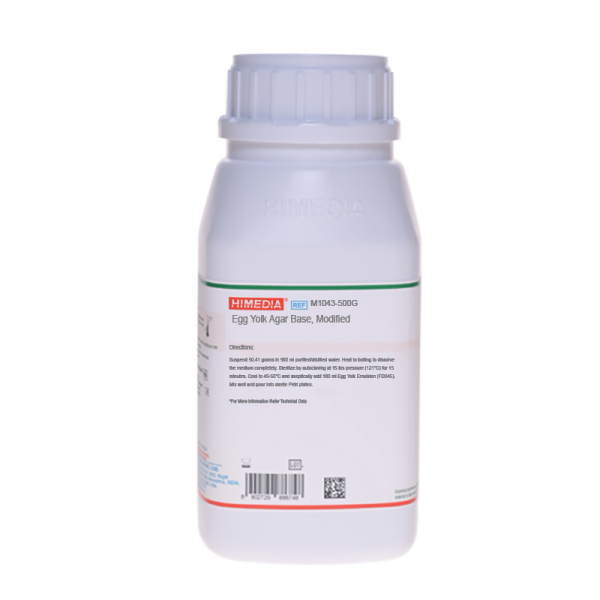 Your enquiry has been submitted
Your enquiry has been submitted
Egg Yolk Agar Base, Modified
Intended Use
Recommended for identification of anaerobic bacteria by means of their egg yolk reaction.
Composition**
| Ingredients | g/L |
|---|---|
| Tryptone | 15.000 |
| Soya peptone | 5.000 |
| Yeast extract | 5.000 |
| Sodium chloride | 5.000 |
| L-Cystine | 0.400 |
| Hemin | 0.005 |
| Vitamin K1 | 0.010 |
| Agar | 20.000 |
| Final pH (at 25°C) | 7.5±0.2 |
**Formula adjusted, standardized to suit performance parameters
Directions
Suspend 50.41 grams in 900 ml purified / distilled water. Heat to boiling to dissolve the medium completely. Sterilize by autoclaving at 15 lbs pressure (121°C) for 15 minutes. Cool to 45-50°C and aseptically add 100 ml Egg Yolk Emulsion (FD045) (or add 10 ml of sterile egg yolk emulsion (FD045) per 90 ml of medium). Mix well and pour into sterile Petri plates.
Principle And Interpretation
Clostridium perfringens food poisoning is one of the most common types of human food borne illness (1). The foods usually involved are cooked meat or poultry products containing large numbers of viable cells. A heat-labile enterotoxin produced only by sporulating cells (2) induces the major symptoms of diarrhea in perfringens poisoning. Egg Yolk Agar Base, Modified is based on McClung and Toabe Agar Base (3) for isolation and detection of C. perfringens. In Egg Yolk Agar Base, Modified, CDC Anaerobe Agar is used as a base to prepare the medium. CDC Anaerobe Agar is a non-selective, highly enriched medium for the cultivation of obligate anaerobes, developed by Center for Disease Control (CDC) (4). The medium is made suitable for detection of lipase and lecithinase activity by the addition of egg yolk emulsion (5,6,7).
Tryptone and soya peptone provide the essential nutrients along with carbonaceous and nitrogenous substances. Yeast extract supplies B-complex nutrients. Sodium chloride maintains the osmotic equilibrium. L-cystine is an amino acid which also acts as a reducing agent. Vitamin K1 and hemin help to enhance the growth of anaerobic organisms. Organisms producing lecithinase break down lecithin present in the egg yolk emulsion producing an insoluble opaque precipitate around the colonies. Lipase-producing organisms break down free fatty acids (in the egg yolk emulsion) forming an iridescent sheen on the surface of the colonies. Lipase activity may be delayed, therefore plates should not be discarded as negative before incubation for a week. Proteolytic activity is seen as clear zones around the colonies (7).
Type of specimen
Clinical- stool, abscess, etc.; Food samples
Specimen Collection and Handling
The media should be directly inoculated with the test specimen. Prior to inoculation, the media plates should be reduced by placing in an anaerobic jar for 18-24 hours. An enrichment broth should be simultaneously inoculated with the test sample to detect small number of anaerobic organisms. Standard procedures for the isolation of organism should be referred. Incubation should be carried out for 18-48 hours and continued for 7 days. After use, contaminated materials must be sterilized by autoclaving before discarding.
Warning and Precautions
In Vitro diagnostic use. For professional use only. Read the label before opening the container. Wear protective gloves/ protective clothing/eye protection/face protection. Follow good microbiological lab practices while handling specimens and culture. Standard precautions as per established guidelines should be followed while handling clinical specimens. Safety guidelines may be referred in individual safety data sheets.
Limitations
- Lipase activity may be delayed, therefore plates should not be discarded as negative before incubation for a week.
- Individual organisms differ in their growth requirement and may show variable growth patterns on the medium.
- Each lot of the medium has been tested for the organisms specified on the COA. It is recommended to users to validate the medium for any specific microorganism other than mentioned in the COA based on the user's unique requirement.
Performance and Evaluation
Performance of the medium is expected when used as per the direction on the label within the expiry period when stored at recommended temperature.
Quality Control
Appearance
Cream to yellow homogeneous free flowing powder
Gelling
Firm, comparable with 2.0% Agar gel.
Colour and Clarity of prepared medium
Basal Medium: Medium amber coloured clear to slightly opalescent gel. After addition of egg yolk emulsion (FD045)- Yellow coloured opaque gel forms in Petri plates.
Reaction
Reaction of 5.04% w/v aqueous solution at 25°C. pH: 7.5±0.2
pH
7.30-7.70
Cultural Response
Cultural characteristics observed with added Egg yolk emulsion (FD045),after an incubation at 35-37°C for 48-72 hours when incubated anaerobically. (*Plates should be incubated up to 7 days before regarding them as negative)
| Organism | Inoculum (CFU) | Growth | Recovery | Lecithinase | Lipase activity* | Proteolytic activity |
|---|---|---|---|---|---|---|
| Clostridium perfringens ATCC 12924 | 50-100 | good-luxuriant | >=50% | positive,opaque zone around the colony | negative,no irridescent sheen on the colony surface and medium | negative,no clear zone surrounding colonies |
| Fusobacterium necrophorum ATCC 25286 | 50-100 | good-luxuriant | >=50% | negative reaction | positive, irridescent sheen on the colony surface and medium | negative,no clear zone surrounding colonies |
| Clostridium sporogenes ATCC 11437 | 50-100 | good-luxuriant | >=50% | negative reaction | positive, irridescent sheen on the colony surface and medium | positive,clear zone surrounding colonies |
Storage and Shelf Life
Store between 10-30°C in a tightly closed container and the prepared medium at 2-8°C. Use before expiry date on the label. On opening, product should be properly stored dry, after tightly capping the bottle inorder to prevent lump formation due to the hygroscopic nature of the product. Improper storage of the product may lead to lump formation. Store in dry ventilated area protected from extremes of temperature and sources of ignition Seal the container tightly after use. Product performance is best if used within stated expiry period.
Disposal
User must ensure safe disposal by autoclaving and/or incineration of used or unusable preparations of this product. Follow established laboratory procedures in disposing of infectious materials and material that comes into contact with clinical sample must be decontaminated and disposed of in accordance with current laboratory techniques (8,9).
Reference
- Labbe R., 1989, Clostridium perfringens, In Foodborne Bacterial Pathogens Ed., Doyle M. P., P.191, Marcel Dekker, New York, N.Y.
- Duncan C. L., 1973, A. J. Bacteriol., 113:932.
- McClung and Toabe, 1947, J. Bacteriol., 53:139.
- Dowell, Lombard, Thompson and Armfield, 1977, Media for Isolation, Characterization and Identification of Obligately Anaerobic Bacteria, CDC Laboratory Manual, Center for Disease Control, Atlanta, Ga.
- Baron E. J., Peterson and Finegold S. M., Bailey & Scotts Diagnostic Microbiology, 9th Ed., 1994, Mosby-Year Book, Inc.,St. Louis Mosby Co., St. Louis.
- Dowell and Hawkins, 1987, Laboratory Methods in Anaerobic Bacteriology, CDC Laboratory Manual, HHS Publication No. (CDC) 87-8272, Centers for Disease Control, Atlanta, Ga.
- Murray P. R., Baron J. H., Pfaller M. A., Jorgensen J. H. and Yolken R. H., (Ed.), 2003, Manual of Clinical Microbiology, 8th Ed., American Society for Microbiology, Washington, D.C.
- Isenberg (Ed.), 1992, Clinical Microbiology Procedures Handbook, American Society for Microbiology, Washington, D.C.
- Jorgensen, J.H., Pfaller, M.A., Carroll, K.C., Funke, G., Landry, M.L., Richter, S.S and Warnock., D.W. (2015) Manual of Clinical Microbiology, 11th Edition. Vol. 1.
| Product Name | Egg Yolk Agar Base, Modified |
|---|---|
| SKU | M1043 |
| Product Type | Regular |
| Physical Form | Powder |
| Origin | Animal |
| Packaging type | HDPE |
| References | 1. Labbe R., 1989, Clostridium perfringens, In Foodborne Bacterial Pathogens Ed., Doyle M. P., P.191, Marcel Dekker, NewYork , N.Y., |





